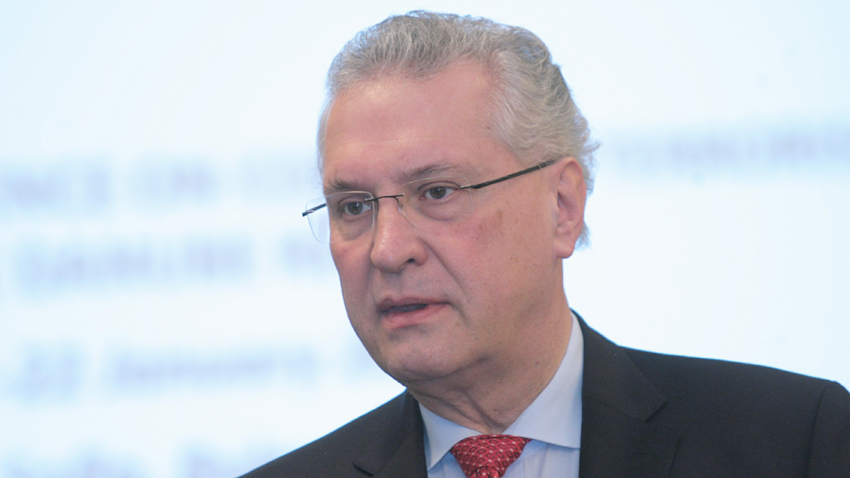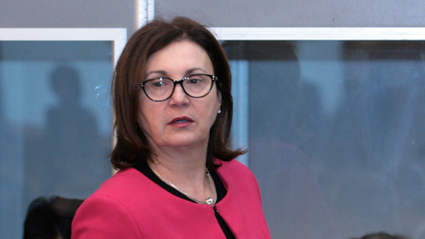The ongoing refugee wave through the Balkans to Western Europe has been constantly on the first pages of the newspapers and in the focus of the newscasts. Moreover, the European Union is still unable to solve the issue regarding the continuous migratory inflow. It was one of the main topics of discussion between Bavarian Minister of Interior Joachim Herrmann and Bulgaria’s President Rossen Plevneliev and Bulgaria’s Deputy Premier and Minister of Interior Rumiana Bachvarova in Sofia.
This week the Austrian government did what Bavaria has been insisting for in Germany since last autumn - it adopted a maximum threshold of the number of refugees it would receive this year. German Chancellor Angela Merkel is categorically against such an idea. However, following the events on the New Year’s Eve in Cologne, the refugee issue threatens the stability of the German coalition cabinet. Joachim Herrmann from the conservative Christian Social Union is in coalition with the Christian Democratic Union of Germany headed by Chancellor Merkel. He insists that Germany must introduce a quota for those who wish to settle in that country. As a result, the number of migrants in the countries of the so-called Balkan route, including Bulgaria, may rise significantly.
 “It is very important for us to take decisions together and avoid any surprising moves. Austria’s decision was surprising, although it was made in the right direction”, MR. Herrmann told the Bulgarian National Radio. “I think that all countries are ready to introduce new and stricter measures and restrictions. However, when such steps are undertaken, there is always a transition period and we can’t rule out the possibility of refugee crowding in some countries. It will be so until our message reaches the countries of origin of those refugees and the message is that it is meaningless to head towards Europe.”
“It is very important for us to take decisions together and avoid any surprising moves. Austria’s decision was surprising, although it was made in the right direction”, MR. Herrmann told the Bulgarian National Radio. “I think that all countries are ready to introduce new and stricter measures and restrictions. However, when such steps are undertaken, there is always a transition period and we can’t rule out the possibility of refugee crowding in some countries. It will be so until our message reaches the countries of origin of those refugees and the message is that it is meaningless to head towards Europe.”
Bulgaria’s Deputy Premier Rumiana Bachvarova was asked at a joint press-conference following her meeting with Joachim Herrmann whether she approved the proposal of the Czech Republic that Bulgaria and Macedonia should turn into buffer zones of the migrant flow.
“We have not discussed such a proposal and I can’t find enough reasons for such an idea to be fulfilled.”
The visit of Bavarian Interior Minister to Sofia is linked with the signature of the Police partnership agreement between Bulgaria and Bavaria in the fight against terrorism, illegal immigration, human trafficking, corruption, prostitution and drug smuggling. However, in Rumiana Bachvarova’s words, another topic was also in focus.
 “Within the context of the contemporary challenges such as immigration wave and fight against terrorism, it is important for us to exchange experience with our German partners. I am confident that we must cooperate actively in all common issues related to the refugee wave. The increased border control and the security of our country is our top priority. Bulgaria provides a high level of protection of the EU external border. The protection of the external borders however, requires shared responsibility, common approach and joint actions of all EU member states. That is why Bulgaria will work in that direction in the future.”
“Within the context of the contemporary challenges such as immigration wave and fight against terrorism, it is important for us to exchange experience with our German partners. I am confident that we must cooperate actively in all common issues related to the refugee wave. The increased border control and the security of our country is our top priority. Bulgaria provides a high level of protection of the EU external border. The protection of the external borders however, requires shared responsibility, common approach and joint actions of all EU member states. That is why Bulgaria will work in that direction in the future.”
Apparently, there are no differences between Bulgaria and Bavaria on this topic: Bavarian Interior Minister Herrmann explicitly underlined that the restrictive measures against the refugee flow towards Western Europe do not aim at destabilizing the Balkan states.
“Let us make it clear - the purpose of our strategy is not to make things difficult for Bulgaria. I thanked Bulgaria’s Interior Minister for the excellent protection of the EU external border with Turkey. We are rather talking about a clear message that has to be sent to the countries from the Middle East and Africa that the unlimited flow of people to Europe must stop.”
The migratory pressure is the topic which divides the EU member states the most. Many countries from the Schengen Area even re-introduced border control. Others built border fences. Despite the fact that the EU states agreed that the distribution of the refugee would be based on a quota principle, the agreement has not been applied in practice. Although the nationalistic mood has been recently rising in Europe, Joachim Herrmann called on the EU states to find a common solution to the refugee problem, because:
“We must understand that a strong Europe it is to the interest of all EU member states. If some countries believe they can cope with the situation without the EU, they are very wrong. Look at the global developments - the situation in Russia and China, the growing influence of other world forces. Against that backdrop, we can be successful, only if we stay united in strong Europe. We must persuade all EU citizens, including the ones who are susceptible to populist slogans. A strong and united Europe is to the interest of Germany and Bulgaria. Every now and then we have to make amendments to the EU policy, but we must never question the existence of the union.”
English version: Kostadin Atanasov
Bulgaria’s National Assembly rejected President Rumen Radev’s veto on the amendments that expand the powers of the special commercial administrator of Lukoil, reported BNR’s correspondent Maria Fileva. The MPs from the ruling majority, supported by..
President Rumen Radev has vetoed the legislative amendments related to the appointment of a special commercial administrator in the Lukoil refinery in Burgas. The head of state said that the amendments undermine the legal order in..
Convulsions Before Multipolarity — a Time When Illusions Are Sacred and Truth Is Heresy is the title of a new book that will be officially presented in early November in Sofia. It explores the agony of a unipolar world, an era of geopolitical..

+359 2 9336 661
